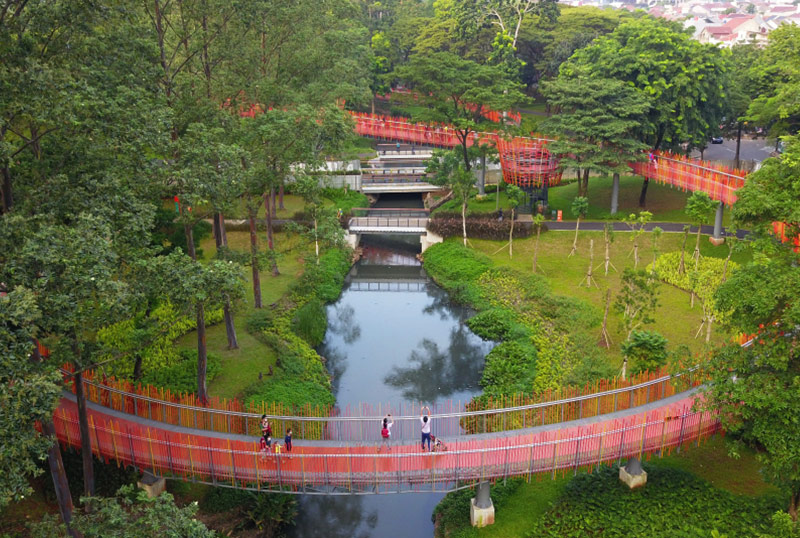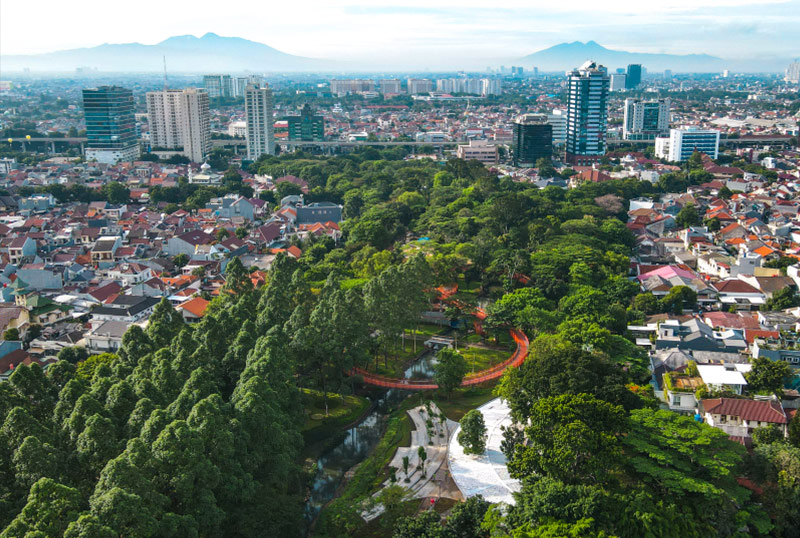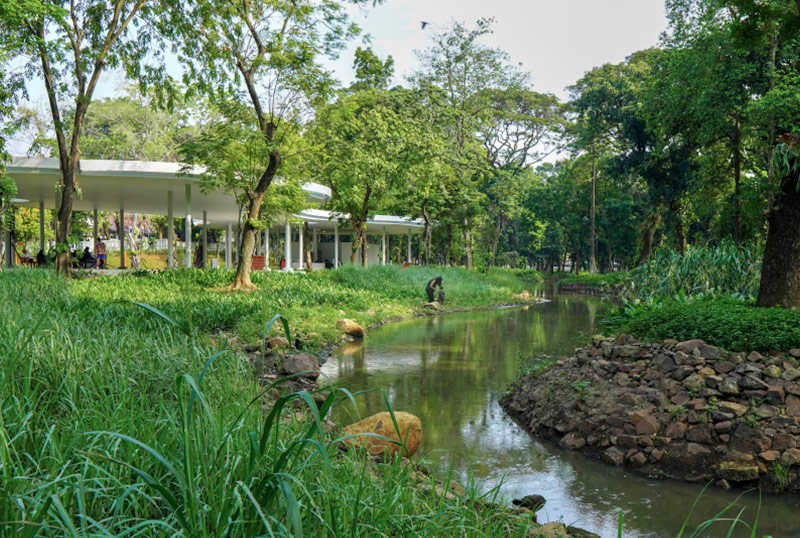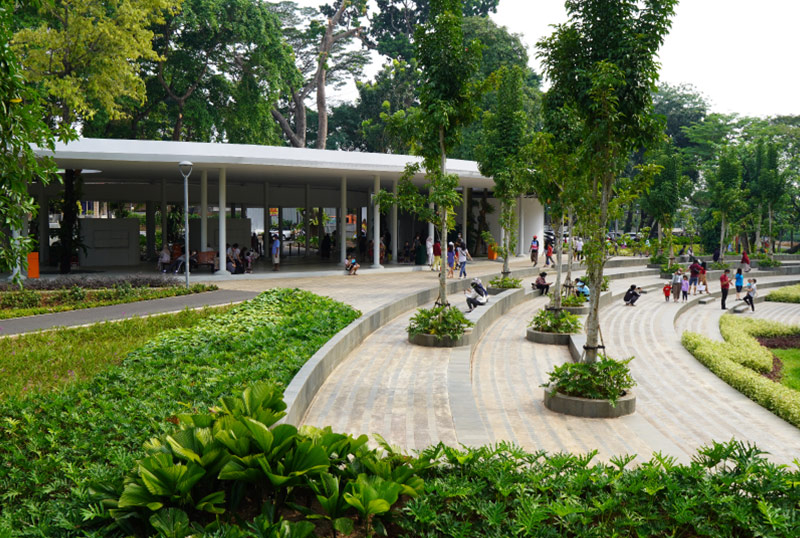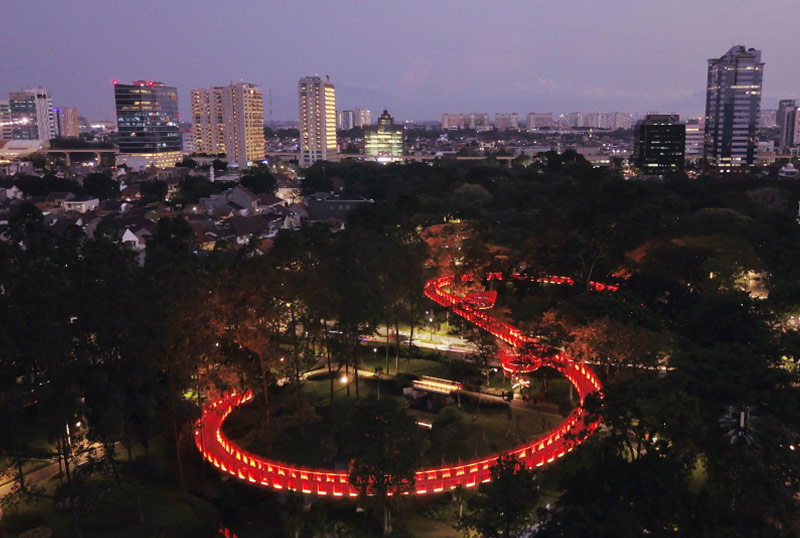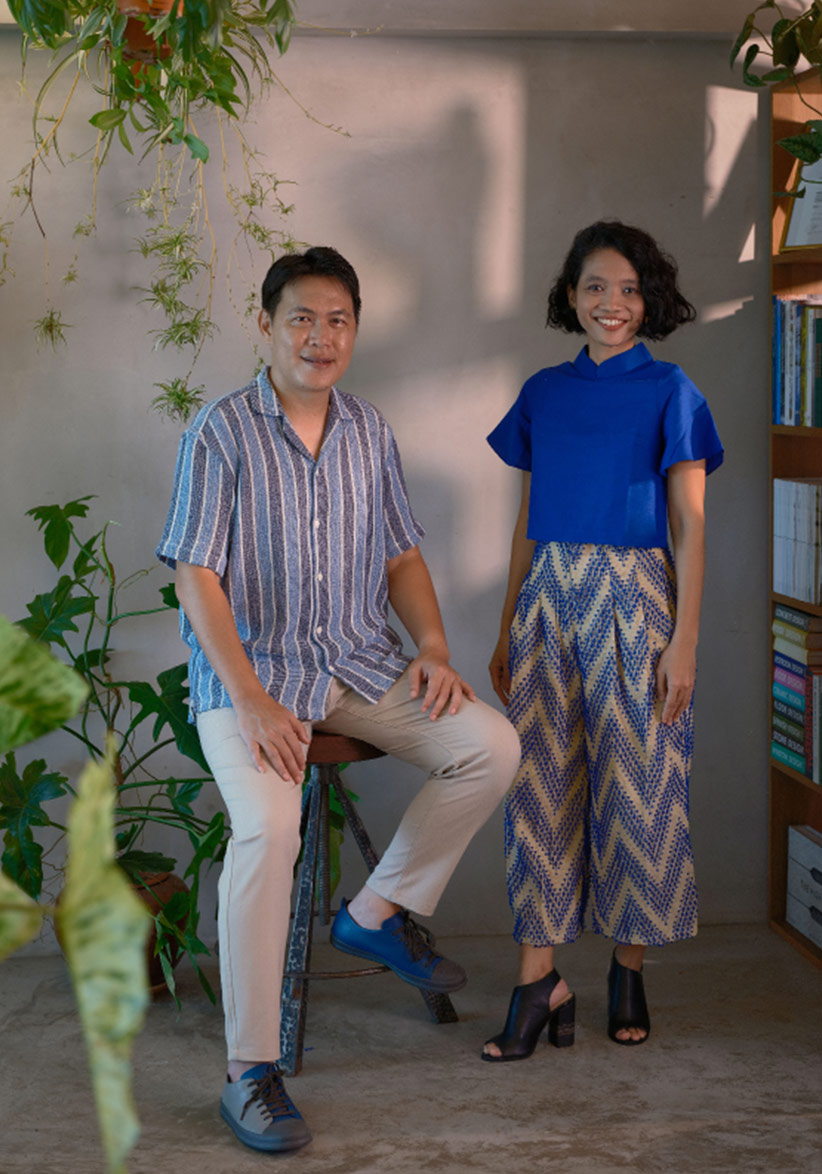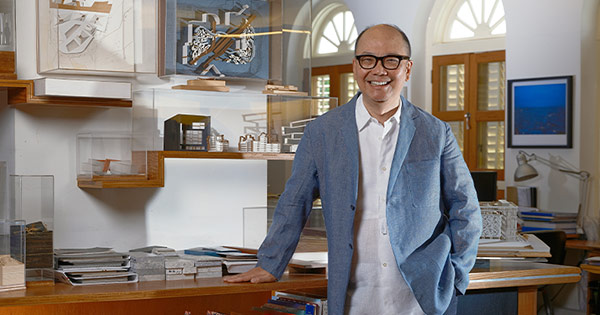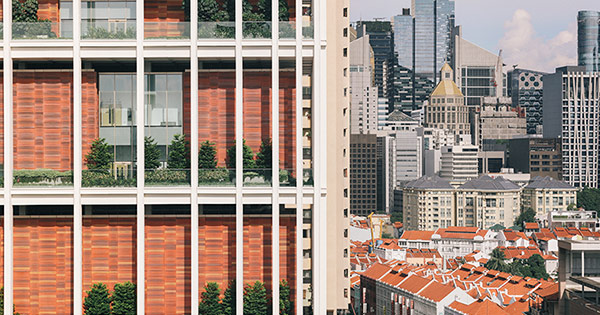DESIGN OF THE YEAR 2023
Tebet Eco Park
Designer
SIURA Studio Pte Ltd
CONTACT
[email protected]
An ageing public facility. A polluted waterway. A site for dumping waste. This is what a park in Tebet, a district of South Jakarta, was to the people who lived around it for over a decade. Today, the 7.3-hectare green area known as Tebet Eco Park not only draws in a high volume of visitors daily but also attracts fish, birds, and other wildlife.
What spurred the transformation is a revitalisation of the park that went beyond a cosmetic upgrade. An existing 714-metre-long waterway canal made of rubble and concrete was re-naturalised into a meandering river with wetlands that can better manage frequent flooding during large storms while cleaning the water. A new bridge now links the park, which is divided into two by a busy road, while rising beneath the existing mature trees to offer the experience of walking amidst the canopy. New spaces were created to bring visitors closer to nature, including a community lawn, a thematic garden, a large playground, and more.
The multi-layered design by SIURA Studio, led by Anton Siura, has refreshed the park and regenerated it into an ecological asset for the city. As one of the first landscape projects in Jakarta to employ an ecological design approach, the park has also planted a seed for more sustainable designs to grow across the city and even beyond.
About the Designer
SIURA Studio is an urban design and landscape architecture studio based in Singapore that focuses on urban resilience and innovative design approaches, each tailored for site-specific contexts. The studio’s collaborative design process is influenced by climatic, environmental, and cultural considerations. SIURA Studio prioritises urban regeneration and eco-sustainable planning as the core of its practice. Its creative design process is consistently guided by compelling narratives to create impactful projects that benefit the land, communities, environments, and cities.
Anton Siura is an accredited landscape architect and Principal of SIURA Studio. Throughout his design career, Anton has played a major role in urban design and landscape architecture projects across Singapore, Indonesia, and beyond. Prior to establishing SIURA Studio, he played a key role in the design process of numerous award-winning projects such as the Punggol Promenade, Bidadari Park, and Kampung Admiralty. Anton has also taught landscape architecture design studios at the Nanyang Academy of Fine Arts and the National University of Singapore.
Anton seeks innovative solutions for global issues such as climate change, biodiversity loss, and inclusive social space. He prioritises natural assets and cultural contexts, which enables him to execute projects that are highly impactful in regenerating urban space while emphasising design functionality and aesthetics.
LANDSCAPE ARCHITECT
SIURA Studio Pte Ltd
QUANTITY SURVEYOR
PT Lantera Sejahtera Indonesia
INFRASTRUCTURE ENGINEER
PT Wahana Krida Konsulindo
CONSTRUCTION MANAGEMENT
PT Disiplan Consult
CLIENT
PT Award Global Infinity
DKI Jakarta Park and Forest Service
INDONESIA ARCHITECT FIRM
Studio Sae
ARBORICULTURIST
PT Ruang Hijau
VISUAL IDENTITY AND BRANDING
Suka Studio
MAIN CONTRACTOR
PT Idealand Cipta Hijau
LANDSCAPE ARCHITECT
SIURA Studio Pte Ltd
QUANTITY SURVEYOR
PT Lantera Sejahtera Indonesia
INFRASTRUCTURE ENGINEER
PT Wahana Krida Konsulindo
CONSTRUCTION MANAGEMENT
PT Disiplan Consult
CLIENT
PT Award Global Infinity
DKI Jakarta Park and Forest Service
INDONESIA ARCHITECT FIRM
Studio Sae
ARBORICULTURIST
PT Ruang Hijau
VISUAL IDENTITY AND BRANDING
Suka Studio
MAIN CONTRACTOR
PT Idealand Cipta Hijau
1MORE THAN AN UPGRADE
The revitalisation of this ageing park in Tebet went beyond a cosmetic makeover. It was redesigned to be more adaptable to the challenges of climate change and meet the needs of its surrounding community.
(Photo by Rahmat Illahi)
2A GREEN LUNG
The park is surrounded by a residential area and a commercial street, and was already popular with people. This convinced SIURA Studio of the impact it could make by transforming it into an ecological asset for the city.
(Photo by Rahmat Illahi)
3RENATURALISING A RIVER
A key project feature was transforming a 714-metre-long concrete canal into a meandering river. This increased its storage capacity and enhanced the park’s ability to better manage runoffs during heavy rains. A more biodiverse ecosystem created along the river also cleans the water and turns it into a welcoming space for visitors and wildlife.
(Photo by Rahmat Illahi)
4A PARK FOR ALL
The park was designed with various zones that offer visitors different ways to enjoy nature. Features include an arrival pavilion that houses food stalls; a community lawn for gatherings and events; a wetland boardwalk to get up close with the river; and a playground with equipment inspired by the animals that live in swampy habitats.
(Photo by Rahmat Illahi)
5A MODEL PARK
The success of Tebet Eco Park’s ecological design approach offers a shining example of how cities can create new natural assets even as they urbanise.
(Photo by Rahmat Illahi)
(L-R) Anton Siura and Febrianty Madyansari.
(Photo by Ivan Loh)
Insights from the Recipient
Anton Siura (AS): Our involvement started after we won a competition organised by the Jakarta government in 2019 to revitalise the city’s Rangunan Bio Park. We were subsequently recommended to carry out a similar project for the park in Tebet. That was when I visited it for the first time. Its water canals were polluted and there was even a garbage collection corner piling up with rubbish. But at the same time, I was so impressed by the park’s beautiful and mature trees. It was also prominently located between a residential area and a commercial street, and many people were using the park even though it was not ideal. These things convinced me that the park had a lot of potential to unlock through a design transformation.
AS: We believe that it is crucial to consider the long-term impact of any project that we take on. In the case of this ageing park, merely upgrading it would have brought about short-term benefits but failed to address its sustainability and resilience for future generations of park users.
Prior to the revitalisation, the park was prone to flooding for hours after it rained, which damaged the existing natural resources and infrastructure. We wanted to showcase how an ecological design approach could create a more resilient park that adapts to climate change. While we have carried this out in our park projects in Singapore, it is new in Jakarta. I was eager to lend my expertise to create a prototype. We wanted to create a space that would benefit the community, support local wildlife, and become an ecological asset.
In these ways, the park could help the people of Jakarta reconnect with nature. As their city is full of concrete and is known for traffic jams, our park could offer the people a healthier environment, especially for those who work and live around it.
AS: One of the biggest challenges was a lack of established guidelines or best practices to follow. We had to use our projects completed in Singapore to convince the local consultants and government departments that this was a tried and tested solution that can work for Jakarta too. We thought it would be difficult for the locals to re-naturalise a river for the first time, but it went quite smoothly because many of the construction workers come from villages in Indonesia. They may not know how to read our technical drawings, but they are familiar with these ways of working with nature.
Another challenge was that I could not travel to Jakarta to supervise the project due to the pandemic. But I did video calls to demonstrate how things should be done and had a local consultant to translate the designs to the workers. It was our first time supervising a project over video.
AS: We made sure the park incorporated design elements that would benefit not just the community but also nature. For example, we constructed wetlands and planted specific vegetation to filter the incoming polluted grey water and provide habitats for flora and fauna. Visitors to the park can now see fish, frogs, and birds. In addition, we designed a path that loops around the park so visitors can interact with nature while they exercise. They can experience nine different zones, including gardens, lawns, wetlands, and forests. The park design thus balances human needs and the environment, while also contributing to the health and wellbeing of both.
Based on our research into parks in Jakarta, Tebet Eco Park is unique because many of such existing spaces in the city do not offer a recreational space within a natural setting. They are mostly gardens with no wildlife or concrete plazas with monuments. But the pandemic showed how people want more spaces with natural features. This is why the park has become very popular. I’ve visited it multiple times since its opening and have seen many happy faces. Many visitors also post on social media to invite others to visit the park. It has created a strong sense of belonging, not only among the Tebet community but also the rest of Jakarta.
Not withstanding the pandemic, the project was completed in just 15 months. This is extremely fast given its scale and complexity. How did your team pull it off?
Our very dedicated multidisciplinary team helped to identify the risks and issues from the concept design stage to its construction. As designers, we worked very hard to ensure our drawings were clear to avoid any unnecessary clarifications. During the construction phase, we worked with the local contractors to make necessary design changes without affecting the timeline. What was also key was the immense trust the client and local consultants had in us. This gave us freedom to execute the design and it sped up the approval process. Everyone was committed to our design vision because they had seen how well such parks had been done in Singapore.
Citation
Jury Citation
Nominator Citation
Anies Rasyid Baswedan
Governor
Jakarta Provincial Government (2017–2022)
In just 15 months, a once neglected and degraded public park in South Jakarta beset with a host of environmental and social problems was transformed into a large and vibrant park embraced by the local community.
The intensity and process of the revitalisation and regeneration of Tebet Eco Park was astounding given its seemingly insurmountable challenges – the degraded condition of the site, tight time constraints, and a lack of local precedents for such restorative solutions. Tebet Eco Park is a successful prototype for a more nature-based, sustainable, and regenerative approach to public parks in Jakarta, minimising the impact of flooding with good design.
The park revitalisation has had a strong impact on the community, with greater visitor comfort, higher programme engagement, and the provision of a safe and inclusive space for everyone.
The Jury commends the project for its reflection of resourcefulness, the return of natural resources to the city and its people, and its reinvention of a park now beloved and well-used by the community.
Jakarta is a fast-growing megapolitan with complex urban fabrics and networks. With a population of more than 10 million, it has multifaceted citizens who need further lifestyle elaboration beyond the home and workplace. There is a general need for spaces that accommodate outdoor and social activities and a third space with designated communal purposes to interact and thrive as a society – transcending cultural, economic, and social barriers. Therefore, it is important to acknowledge the pivotal role of public open spaces that not only cater to social needs, but also provide ecological value. From the many efforts to reinvigorate Jakarta’s open spaces, Tebet Eco Park stands out as one of the most successful examples of park revitalisation.
Tebet Eco Park is a project that represents the value of a collaborative and holistic design approach. It is a real testament to a significant commitment made by Jakarta and the city’s stakeholders to ensure that the community participates actively, while also engaging experts in a multidisciplinary approach. Consequently, it succeeded in tackling the site challenges by reducing the risk of flooding with river renaturalisation. It also provides a wide range of recreational, educational, and social activities and programmes for the community. It is an inviting blue-green open space that is accessible by people of all ages, backgrounds, and conditions; a space that truly connects people with nature.
I believe Tebet Eco Park has a greater impact beyond Jakarta city. A week after the opening, it received more than 60,000 visitors per day who came from regions outside of Jakarta. The park has even sparked the curiosity of international visitors. The success of this park is a profound message that this is the right direction towards building a more liveable and healthier city – socially, economically, and environmentally. This park has set an example that will continue to inspire more sustainable and impactful public park projects to come.

